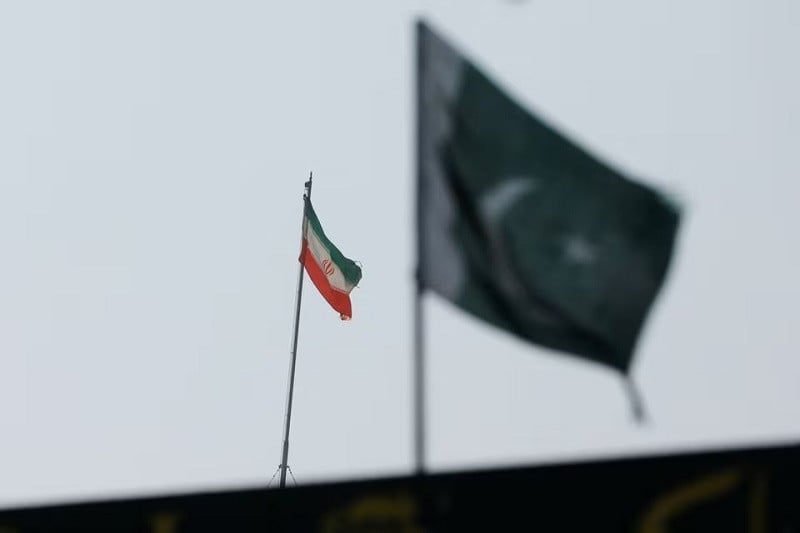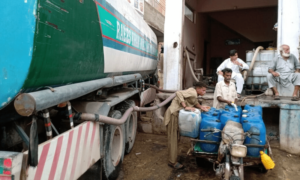Director of the Indo-Pacific Security Programme Lisa Curtis at CNAS has warned that heightened tensions between nuclear-armed neighbours Pakistan and Iran have raised concerns in the United States, with fears of the situation spiralling out of control.
In an interview with VOA Deewa, Curtis, a seasoned foreign policy and national security expert, highlighted the motive behind Iran’s recent incursion into Pakistan, linking the move to a retaliatory response following the double suicide bombing on January 3, an attack claimed by Dai’sh.
“So I think Iran needed to show that it will strike back when attacked and Pakistan, in some ways, is viewed as an easier target, allowing Iran to show its people a retaliatory response to the terrorist attack without provoking Israel or the US,” Curtis said.
Curtis stressed the importance of US concern for regional stability, cautioning against potential escalation. Amid existing tensions in the region, including between Pakistan and India, as well as with the Taliban, she warned of the possibility of chaos if not handled carefully.
“Pak-India tension is always high, there are also tensions between Pakistan and Taliban because they are avoiding cracking down Tehreek-e-Taliban (TTP) terrorists,” she warned, expressing concerns about possible chaos if not handled carefully.
She asserted that Pakistan and Iran would have to diffuse the tensions, noting their apparent movement in that direction with Pakistan talking about brotherly relations and Iran also separating Pakistani people and officials from terrorists. She believes this indicates their joint efforts to de-escalate the current tense situation.
In response to a question about the timing chosen by Iran for intrusion in Pakistan, Lisa said it was intended to send an international signal. According to her, Iran aimed to demonstrate strength and resilience, reassuring the world that it remains formidable and ready to confront any aggression.
“Despite the recent terrorist attack, Iran sought to project strength, and unfortunately Pakistan happened to be one of the targets” she added.
While acknowledging recent moves by Pakistan and Iran towards de-escalation, Curtis emphasised that the region remains at risk. “Baloch separatists in Iran that have been attacked could retaliate inside Pakistan and so what will happen then?” Curtis questioned, highlighting potential risks despite the ongoing efforts for de-escalation.
Contrary to prevailing views, Lisa underscored the current problems Pakistan faces never allowing it to entangle in any regional conflict.
She pointed out key issues such as the country’s economic downturn, reliance on the IMF package, terrorist attacks and upcoming imminent polls, which comes at a time when the establishment’s reputation has suffered because it seems holding down the most populous party Pakistan Tehreek-Insaf (PTI) and incarcerated its chairman, Imran Khan.
Responding to a question regarding the future of Baloch terrorists, she underlined the counterproductive nature of resorting to terrorism. She emphasised that terrorist activities will make life worse for Baloch on either side.
Also read: Iranian stunt
She said that violent insurgencies will not help Baloch cause in any way, shape or form to gain any additional rights or economic benefits.
Discussing China’s role in the current situation the senior expert observes that Chinese officials might believe they should be able to influence the situation. She asserted that when it comes down to it, they really can’t influence regional developments as much as they might hope to.
“China only has so much influence and power in this kind of volatile situation, it enjoys strong and traditionally close relations with Pakistan, as well as endeavours to maintain positive ties with Iran, but its influence has limits,” she asserted.
She emphasized that even with the strength of the China-Pakistan relationship, it’s crucial to recognise the limitations of Chinese mediation. In her view, the effectiveness of Chinese involvement may not meet the expectations, particularly in complex and unstable situations.
Sharing her observations regarding the upcoming polls in Pakistan, she believes that there is a malaise about the political situation and the elections, with not much enthusiasm for the polls.
“There is a perception among the people of Pakistan that the establishment, seen as the centre of power, has picked the party of choice, and the popular PTI doesn’t stand much of a chance. Unfortunately, there is a lack of faith in the country’s democratic process,” Lisa raised concern.
She highlighted the downturn in Pakistan’s economic situation and high inflation, which makes things more difficult. She believes there is a general kind of malaise in the country. Regarding security, she pointed out that TTP terrorists have also become a headache for Pakistan’s security institutions.
“There is deep frustration among the Pakistan security establishment about their lack of ability to influence the Taliban to crack down on TTP terrorists on its territory,” she claimed.
Curtis believes that the independent position taken by the Taliban, not feeling the need to answer to Pakistan or fulfil Pakistan’s requests, is quite new and surprising for the Pakistani establishment. “A new situation is emerging in the region, and Pakistan is navigating its stance in light of a newly confident Taliban that now has options beyond the Pakistan military establishment,” she added.
The senior security expert is not satisfied with the security situation in Khyber-Pakhtunkhwa (K-P) and Balochistan and believes that one of its reasons is the rise of the Taliban. She underscores the shared ideological attraction between the Taliban and various other terrorist groups, emphasising that this alignment in ideological principles allows these groups to operate more freely in Afghanistan, as the Taliban’s control provides them with a relatively secure environment.
“The lack of pressure on terrorist groups, owing to the Taliban’s control in Afghanistan, is having a counterproductive effect. It is backfiring into Pakistan, leading to more insecurity and more Taliban-type influence happening in the region, impacting elections, the economy, and women and girls,” Curtis said.
She said that the oppression of women and girls under the Taliban regime in Afghanistan is indeed having a deep effect within Pakistan, where women and girls are also suffering because of this backward fundamentalist ideology that the Taliban is bringing to the region.







